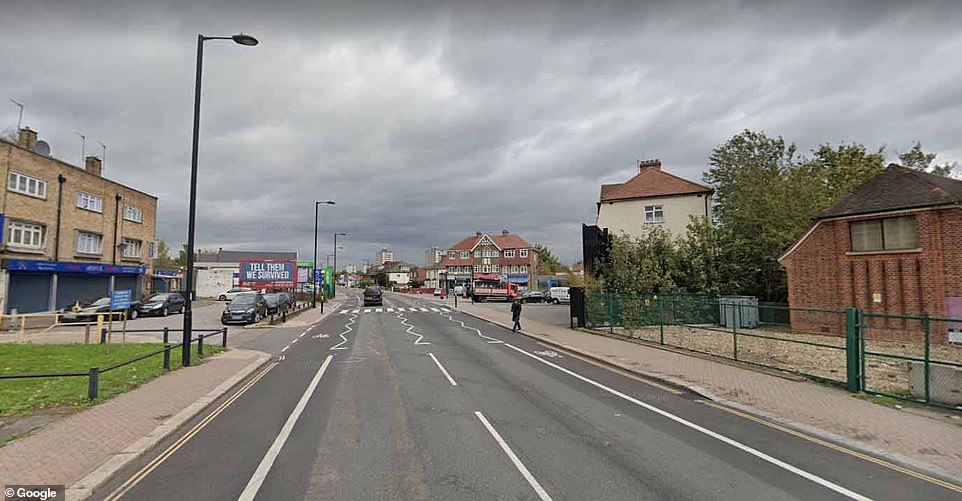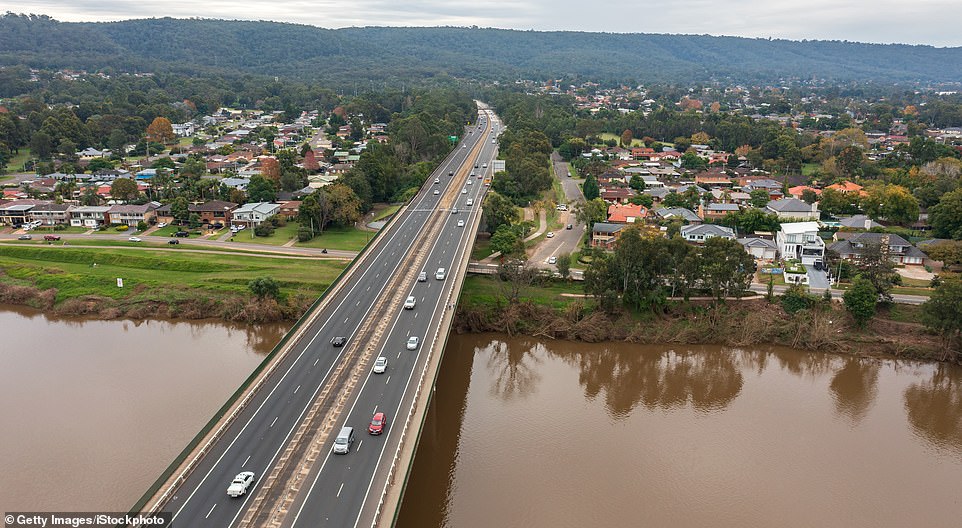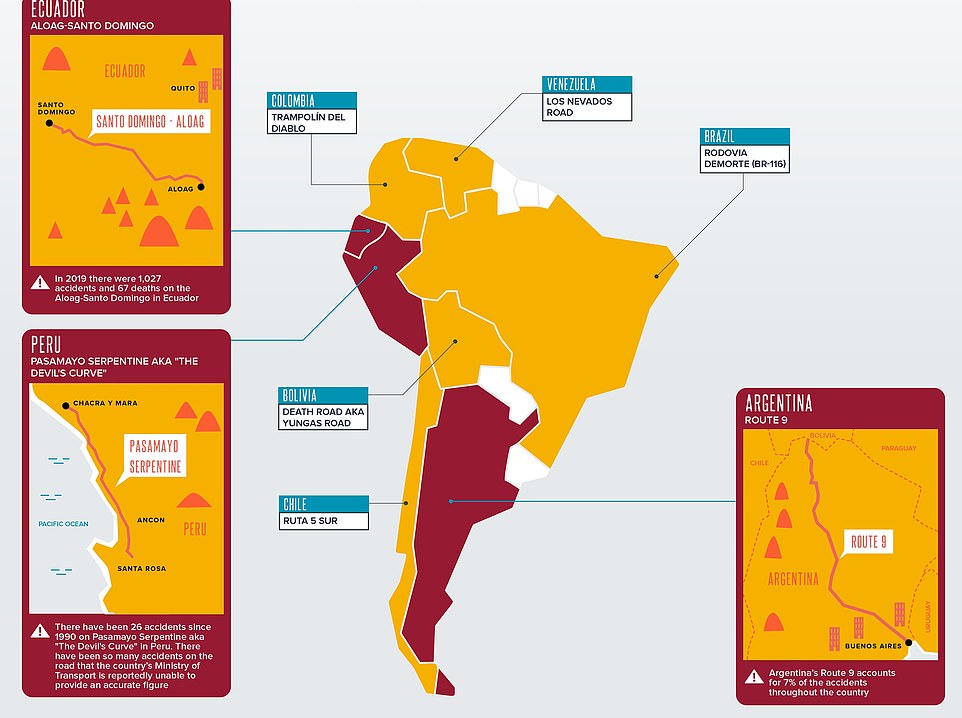The world’s most deadly roads have been revealed – and presented in a series of maps – with new research outing the A1010 as the UK’s worst stretch of tarmac.
Findings show that the road, running from Tottenham to Waltham Cross, has a rate of 12.7 accidents per one million vehicle-miles driven – nearly nine times the national average.
Meanwhile, in the US Interstate 45, spanning north from Galveston to Dallas, has been shown to be the deadliest thoroughfare, with five fatal accidents for every 100 miles.

In Europe, findings revealed the M-06 in the Ukraine, which connects Kyiv to Chop, as the most dangerous route to take. In 2019 and the first quarter of 2020, there were 757 road accidents with almost 200 fatalities

The A1010, running from Tottenham to Waltham Cross, has a rate of 12.7 accidents per one million vehicle-miles driven – nearly nine times the national average

In North America the Pan-American Highway, which crosses El Salvador from north to south, has been outed as the worst road. It claimed 184 deaths in 2016

In the US, the Interstate 45 spanning north from Galveston to Dallas, has been shown to be the deadliest thoroughfare, with five fatal accidents for every 100 miles
THE WORLD’S DEADLIEST ROADS
Researchers, commissioned by insurance company Budget Direct, used information gleaned from government websites, news reports and transport associations to generate a report detailing the world’s deadliest roads.
Given that some road ratings are defined by accidents, some are defined by deaths and the years quoted aren’t the same for all, it’s hard to create a defined global ranking.
However, the team picked out the roads with the most extreme accident rates to highlight the worst of the lot:
NORTH & CENTRAL AMERICA
El Salvador – Pan-American Highway
The Pan-American Highway, which crosses El Salvador from north to south, claimed 184 deaths in 2016 making it the most dangerous road in North and Central America.
SOUTH AMERICA
Bolivia – Death Road, aka Yungas Road (in La Paz)
Bolivia’s ‘Death Road’, officially called Yungas Road, weaves through the Cordillera Oriental mountain chain and is mostly less than 10ft wide with a sheer drop on one side. Between 200 and 300 people perish on it each year. Thankfully, the authorities built an alternative route, and Death Road is now reserved for thrillseekers.
EUROPE
Ukraine – M-06 Kyiv-Chop
The M-06, which connects Kyiv to Chop, is the most dangerous route to take in Europe. In 2019 and the first quarter of 2020, there were 757 road accidents with almost 200 fatalities.
SOURCE: Budget Direct
MIDDLE EAST & CENTRAL ASIA
Israel – Highway 90
The Dead Sea Highway, part of Israel’s Highway 90, which links Metula and the northern border with Lebanon, is deemed the worst road in the Middle East and Central Asia. The route features old foundations dating from the 1960s and there are no barriers between the left and right lanes. Since 2003, 233 people have died on the road and 700 have been seriously injured.
ASIA & OCEANIA
Bangladesh – Dhaka-Sylhet highway (N2)
In Asia and Oceania as a whole, the worst road is located in Bangladesh. The Dhaka-Sylhet highway (N2) in Sylhet claimed 250 lives in 2020 alone.
AFRICA
Ghana – Accra to Cape Coast Road
In Africa , the road with the deadliest reputation is the Accra to Cape Coast Road in Ghana, which connects Accra to Cape Coast. Between 2004 and 2011, there were 6,104 accidents and 7,465 casualties.
Advertisement
Researchers used information gleaned from government websites, news reports and transport associations to generate the report and produce infographics showing the deadliest roads for different regions around the world.
In Europe, findings revealed the M-06 in the Ukraine, which connects Kyiv to Chop, as the most dangerous route to take.
In 2019 and the first quarter of 2020, there were 757 road accidents with almost 200 fatalities.
For thrillseekers, researchers hit upon an extreme road in Iceland. Route 622 along the northwestern coast is bordered by cliffs and it runs along the Dyrafjiordur and Arnarfjordur fjords. As the weather gets so extreme in the winter, the road is closed altogether for half the year.
The site www.dangerousroads.org describes Route 622 as being ‘insanely beautiful’, but cautions ‘if you have a Jeep, 4×4 experience, time and steel nerves, it is possible to drive this road’.
Moving back to North America, while the Interstate 45 in the US is prone to many accidents, there is an even worse road in the region. The Pan-American Highway, which crosses El Salvador from north to south, claimed 184 deaths in 2016 making it the worst road of the lot.
Dangerousroads.org says that some of the main risks include ‘high temperatures, landslides, steep drop-offs, livestock in the road and impassable sections during the wet season’.
Researchers also highlighted several other dangerous routes in North America. These are located in Canada (the Revelstone Golden saw 38 fatal crashes from 2004 to 2013), in Jamaica (the Bustamante Highway has claimed no fewer than 90 lives since 2005 and 15 alone in 2011) and in Mexico (on the Mexico-Queretaro Highway there were approximately 3,500 accidents, 3,300 injuries, and 584 deaths between 2009 and 2015).
Nicaragua’s roads are also some of the most dangerous in North America ‘due to pedestrian recklessness, disrespect for traffic signals, and blunders of design’, according to local commentary. In a single year, sixteen people died on a 12km stretch of the NIC-4 where it meets the NIC-20 on the route to Masaya.

In Asia and Oceania the worst road is located in Bangladesh. The Dhaka-Sylhet highway (N2) in Sylhet claimed 250 lives in 2020 alone. Another killer route can be found in Cambodia. National Road 4 from Phnom Penh to Sihanoukville witnessed 90 casualties per day during Khmer New Year in 2005, compared with an annual average of 40 per day

In Australia, 100 people die on the roads every month, with 2,500 or more seriously injured. The worst spot in the country is the M4 Western Motorway from Concord to the M7 in Sydney (pictured)
In Australia, 100 people die on the roads every month, with 2,500 or more seriously injured. The worst spot in the country is the M4 Western Motorway from Concord to the M7 in Sydney.
Around 94,000 vehicles drive this 24km stretch every day.
It saw six deaths and 788 ‘casualty crashes’ in a five-year period, making it the ‘highest risk’ area – although the Hume Motorway/Freeway has the greatest overall number of crashes involving death or injury.
But in Asia and Oceania as a whole, the worst road is located in Bangladesh.
The Dhaka-Sylhet highway (N2) in Sylhet claimed 250 lives in 2020 alone.
Another killer route can be found in Cambodia.
National Road 4 from Phnom Penh to Sihanoukville witnessed 90 casualties per day during Khmer New Year in 2005, compared with an annual average of 40 per day.

Along with Death Road in Bolivia, other treacherous roads in South America can be found in Ecuador, Argentina, and Peru

Its name should serve as a warning but this road in Bolivia, the most dangerous in South America, continues to attract thrillseekers. Officially called Yungas Road, it weaves through the Cordillera Oriental mountain chain and is mostly less than 10ft wide with a sheer drop on one side
In South America, there is a driving route nicknamed ‘Death Road’.
Its name should serve as a warning but this road in Bolivia, the most dangerous in the region with 200 to 300 drivers and passengers perishing on it each year, continues to attract thrillseekers.
Officially called Yungas Road, it weaves through the Cordillera Oriental mountain chain and is mostly less than 10ft wide with a sheer drop on one side.
For this reason, it’s the only place in Bolivia where cars must drive on the left – a safety measure to make seeing the edge of the road easier.
Thankfully, Bolivian authorities built a safer alternative route, and Death Road is now reserved for gutsy tourists.
Along with Death Road, other treacherous routes in South America can be found in Ecuador (in 2019 there were 1,027 accidents and 67 deaths on the Aloag-Santo Domingo), in Argentina (the country’s Route 9 accounts for seven per cent of the accidents throughout the country) and in Peru (there have been so many accidents on the Pasamayo Serpentine aka ‘The Devil’s Curve’ – a 15km stretch with 22 curves – that the Ministry of Transport is reportedly unable to provide an accurate total).

In Africa, the road with the deadliest reputation is the Accra to Cape Coast Road in Ghana, which connects Accra to Cape Coast. Other deadly routes include the Mombasa Road to Nairobi, Kenya, and the Plumtree-Bulawayo-Harare-Mutare Highway in Zimbabwe
Moving over to Africa, the road with the deadliest reputation is the Accra to Cape Coast Road in Ghana, which connects Accra to Cape Coast.
Between 2004 and 2011, there were 6,104 accidents and 7,465 casualties.
Another deadly road on the continent is the Mombasa Road to Nairobi, Kenya. In 2019, 27 people died on it during an eight-month period.
Meanwhile, in Zimbabwe, the Plumtree-Bulawayo-Harare-Mutare Highway saw 569 accidents in 2016 and in Cameroon, the United Nations actually classified its National 3 as one of the world’s most dangerous roads back in 2014.
The National 3, also known as the Douala-Yaoundé road, features dozens of commemorative plaques that mark lost lives.
Nearly one-third of the country’s 3,000 annual accidents occur on this road every year.

In the Middle East and Central Asia, the Dead Sea Highway, part of Israel’s Highway 90, is deemed one of the worst roads with old foundations dating from the 1960s and no barriers between the left and right lanes. It has claimed 233 lives
In the Middle East and Central Asia, the Dead Sea Highway, part of Israel’s Highway 90, which links Metula and the northern border with Lebanon, is deemed the region’s worst road, with old foundations dating from the 1960s and no barriers between the left and right lanes.
Since 2003, 233 people have died on the road and 700 have been seriously injured.
Erez Kita, the head of a safe-driving NGO, told researchers: ‘Highway 90 continues to claim lives as a result of poor infrastructure, which is unforgiving to human error. It’s a 50-years-old road, and its infrastructure should have been upgraded. It’s always easiest to blame the drivers, but not every mistake should end in death, and the infrastructure is meant to protect drivers even if they make a mistake.’
Other dangerous roads in the region can be found in the UAE (the Emirates Road saw 14 deaths and 30 accidents from January to June in 2018) and in Bahrain (the Shaikh Isa bin Salman Highway was the scene of 55 accidents and five deaths in 2019).
Insurance firm Budget Direct, which commissioned the research, said of the findings: ‘News reports covering road accidents around the world reflect the same sad tale: authorities blame motorists, motorists blame authorities, and people keep dying.
‘The development of smart road networks and self-driving cars may make the roads safer over the forthcoming years.
‘But their distribution will be uneven, and some countries will always have more dangerous roads than others.
‘Ultimate responsibility falls to us each in our personal and professional capacities as motorists, politicians, and citizens to do our part in keeping the roads safe for our families and everyone around us.’
Source link : https://www.dailymail.co.uk/travel/travel_news/article-9809519/The-worlds-dangerous-roads-revealed-A1010-deemed-worst-UK.html












